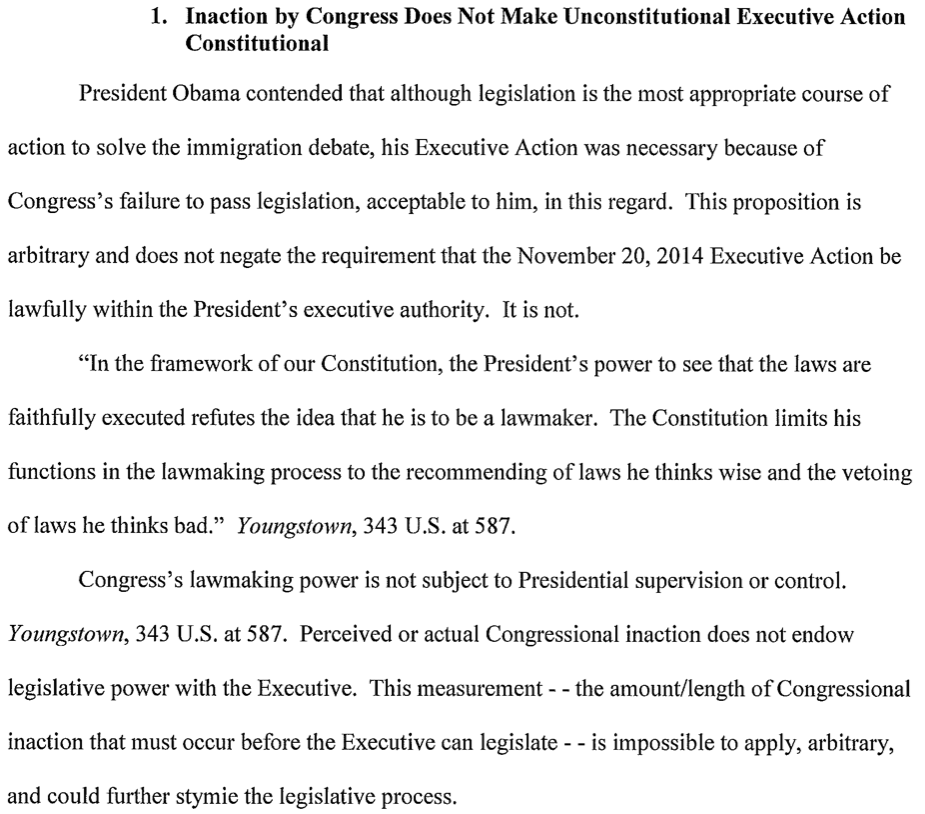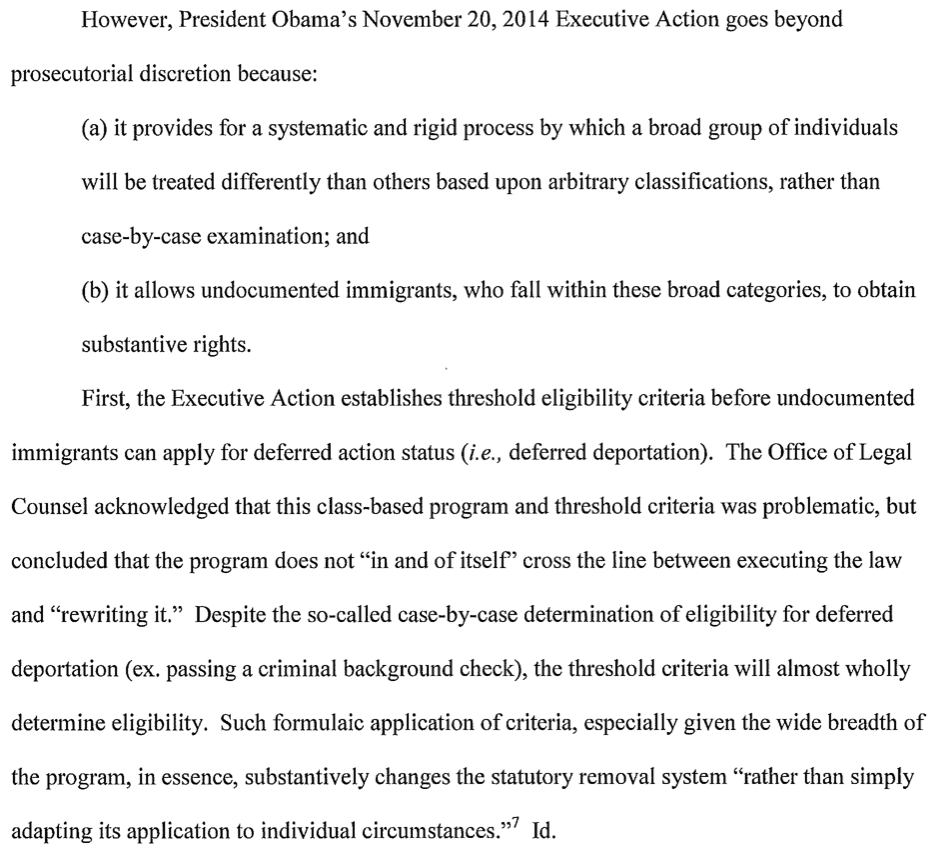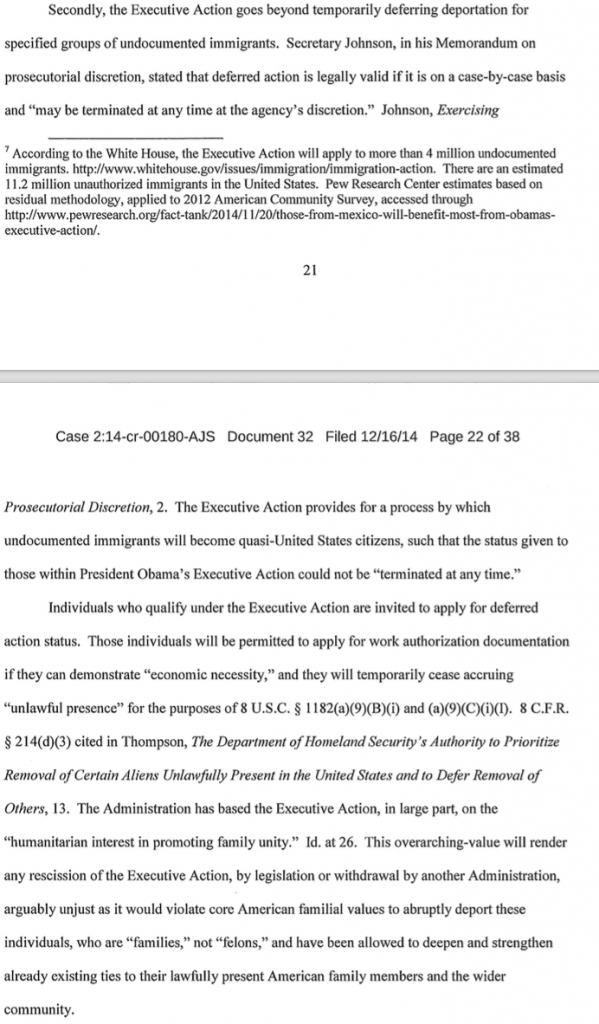A Federal District Court in the Western District of Pennsylvania (where I clerked for a different judge) has found DAPA, President Obama’s executive action on immigration was unconstitutional. Jon Adler links to the opinion. First, as a threshold matter, the procedural posture of this case is somewhat odd. Adler writes:
The case involves an individual who was deported and then reentered the country unlawfully. In considering how to sentence the defendant, the court sought supplemental briefing on the applicability of the new policies to the defendant, and whether these policies would provide the defendant with additional avenues for seeking the deferral of his deportation. In this case, however, it’s not entirely clear it was necessary to reach the constitutional question to resolve the issues before the court with regard to the defendant’s sentence.
In fact, after the analysis finding that DAPA is unconstitutional, the court concluded that it did not apply to the defendant. Even the most basic avoidance cannon would say this was a serious reach. It would have been appropriate, if at all, to say that because the policy doesn’t apply to the defendant, there is no need to reach the constitutionality of DAPA. But the court did the exact opposite.
With that being said, I’d like to offer some preliminary thoughts on the merits of the case, which serve as a preview of things to come in Texas’s DAPA challenge. After walking through the OLC memo, and analysis of the policy, the opinion cites President Obama’s numerous statements explaining that executive action on immigration of this scope would be unlawful.
The core of the analysis is on p. 18-22. First, the court makes a point I’ve been repeating since the summer (SSRN and National Review)–“inaction by Congress does not make unconstitutional executive action constitutional.”
The mere fact that Congress says on to a President does not license him to expand the scope of his executive powers. This was a point that ll 9 Justices agreed upon in Noel Canning.
The court also uses an example I have oft-repeated: could the President use prosecutorial discretion as a means to implement a lower income tax rate?
The court concludes that this executive action “creates laws.”
Next, the court explains why this executive action “goes beyond prosecutorial discretion” and amounts to “legislation.” In short, rather than examining individuals on a “case-by-case” basis, it “provides for a systematic and rigid process” to treat individuals different. Those who “fall within these broad categories” will receive “substantive rights.” This echoes a point I made in National Review–even if DAPA (as well as DACA) is defensible in theory, in practice it is designed to eliminate any meaningful discretion, and rather is designed to amount to a blanket waiver.
The court is right that “the threshold criteria will almost wholly determine eligibility.” I should add that these “threshold criteria” were set by the President after “60 iterations” and telling the lawyers to go further. This “formulaic application of criteria” is a rubber stamp.
Second, the president is not only rearranging his priorities, but also “provides for a process by which undocumented immigrants will become quasi-United States Citizens.”
Making this point eloquently is President Obama. Although DAPA, formerly known as IAEA, only offers a two-year reprieve from deportations, the President admitted what is obvious–once the immigrants receive some status, it will be politically impossible for any future president to remove them.
“It’s true a future administration might try to reverse some of our policies. But I’ll be honest with you — the American people basically have a good heart and want to treat people fairly and every survey shows that if, in fact, somebody has come out and subjected themselves to a background check, registered, paid their taxes, the American people support allowing them to stay. So any future administration that tried to punish people for doing the right thing, I think, would not have the support of the American people,” Mr. Obama told a supportive crowd at a town hall meeting in Nashville. “It’s true, theoretically, a future administration could do something that I think would be very damaging. It’s not likely,politically, that they reverse everything we’ve done.”
This candor makes the President’s claim about the limited scope of the order even less plausible. This quotation should be cited prominently in any motion for a preliminary injunction to show irreparable harm.
Then, the court concludes that DAPA is unconstitutional:
Although I find much of the analysis persuasive, the conclusion simply does not follow. It isn’t clear why the court was even in a position to find the law unconstitutional, nor is it clear what this declaration means. Oh, to be the AUSA who has to tell his/her boss about this order…
I am co-authoring an article that will appear in the Georgetown Law Journal Online on the constitutionality of DAPA. It should appear this spring, and will be on SSRN by the end of the month. Stay tuned.





